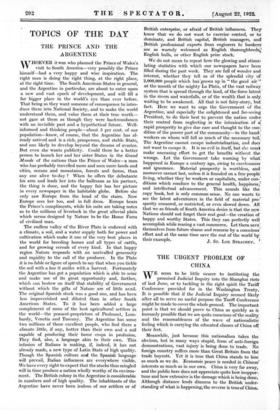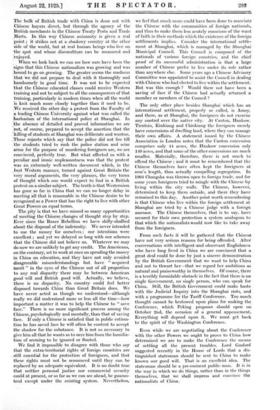THE URGENT PROBLEM OF CHINA W E seem to be little
nearer to instituting the promised Judicial Inquiry into the Shanghai riots of last June, or to tackling in the right spirit the Tariff Conference provided for in the Washington Treaty.: It is possible that if the Judicial Inquiry seemed likely after all to serve no useful purpose the Tariff Conference might be made to cover the whole ground. The important point is that we should prove to China as quickly as is humanly possible that we are quite conscious of the reality, and the reasonableness of the wave of nationalistic feeling which is carrying the educated classes of China off their feet.
Meanwhile, just because this nationalism takes the obvious, but in many ways stupid, form of anti-foreign demonstrations, vast injury 'is being done to trade. No foreign country suffers more than Great Britain from the trade boycott. Yet it is true that China stands to lose as much as we do. Economic peace is needed in Chinese interests as much as in our own. China is very far away, and the public here does not appreciate quite how inoppor-. tune and how extensive is the damage which is being done. Although distance lends dimness to the British under- standing of what is happening, the reverse is true of China.' The bulk of British trade with China is done not with Chinese buyers direct, but through the agency of the British merchants in the Chinese Treaty Ports and Trade Marts. In this way. Chinese, animosity. is given a real .point ; it strikes not at a shadowy country at the other side of the world, but at real human beings who live on the spot and whose discomfiture can be measured and '.enjoyed. When we look back we can see how sure have been the :signs that this Chinese nationalism was growing and was bound to go on growing. The greater seems the madness :that we did not prepare to deal with it thoroughly and handsomely in good time. It was not to be expected that the Chinese educated classes could receive Western training and not be subject to all the consequences of that training, particularly in modern times when all the world is knit much more closely together than it used to be.
received the other day a protest from the Faculty of a leading Chinese. University against what was called the )3arbarism of the international police at Shanghai. In tithe absence of detailed and proved information we are 'not, of course, prepared to accept the assertion that the lilling of students at Shanghai was deliberate and wanton. ,Those reports which say that the police did not fire till the students tried to rush the police station and seize arms for the purpose of murdering foreigners are, we are convinced, perfectly true. But what affected us with a peculiar and ironic unpleasantness was that the protest was an extremely well-written document which, in the best Western manner, turned against Great Britain the very Moral arguments, the very phrases, the very turns of thought which one would expect to find in a British protest on a similar subject. The truth is that Westernism has gone so far .'in China that we can no longer delay in meeting all that is reasonable in the Chinese desire to be recognizedas a Power that has the right to live with other Great Powers on equal terms. The pity is that we have missed so many opportunities of meeting the Chinese, changes of thought step by step. Ever since the Boxer Rebellion we have shiny-sheHied about the disposal of the indemnity. We never intended to use the money for ourselves ; our intentions were excellent ; and yet we delayed so long with our schemes that the Chinese did not believe us. Whatever we may do now we are unlikely to get any credit. The Americans, on the contrary, set to work at once on spending the money in China on education, and they have not only avoided disagreeable misunderstandings but have " acquired merit " in the eyes of the Chinese out of all proportion to any real disparity there may be between American good will and British good will. Actually, we believe, there is no disparity. • No country could feel better disposed towards China than Great Britain does. We have never acted as though we understood—although really we did understand more or less all the time—how important a matter it was to help the Chinese to " save face." There is no more significant process among the Chinese, psychologically and mentally, than that of saving face.. If only a Chinese is satisfied that in public estima- tion he has saved face he will often be content to accept the shadow for the substance. It is not so necessary to give him all that he wants as to save him from the humilia- tion of seeming to be ignored or flouted.
We find it impossible to disagree with those who say that the extra-territorial rights of foreign countries are . still essential for the protection of foreigners, and that these rights must not be renounced until they can be replaced by an adequate equivalent. It is no doubt true that neither personal justice nor commercial security could at present, or so far as we can see ahead, be guaran- teed except under the existing system. Nevertheless, we feel that much more could have been done to associate the Chinese with the communities of foreign nationals, and thus to make them less acutely conscious of the want of faith in their methods which the existence of the foreign settlements implies. Consider the international settle- ment at Shanghai, which is managed by the Shanghai Municipal Council. This Council is composed of the nationals of various foreign countries, and the chief proof of its successful administration is that a large number of Chinese prefer to live under its rule rather than anywhere else. Some years ago a Chinese Advisory. Committee was appointed to assist the Council in dealing with Chinese who had elected to live within the settlement: But was this enough ? Would there not have been a saving of face if the Chinese had actually returned a member or members of the Council ?
The only other place besides Shanghai which has an international settlement, properly so called, is Amoy, and there, as at Shanghai, the foreigners do not exercise any control over the native city. At Canton, Hankow, Tientsin, Kiukiang and Chinkiang the foreigners merely have concessions of dwelling land, where they can manage their own affairs. A statement issued by the Chinese Association in London notes that the 'Canton concession comprises only 44 acres, the Hankow concession only 149 acres, and that some of the other concessions are much smaller. Materially, therefore, there is not much td offend the Chinese ; and it must be remembered that the Chinese themselves have often kept the foreigners at arm's length, thus actually compelling segregation. In 1904 Changsha was thrown 'open to foreign trade, and for some years foreigners tried to mingle with the Chinese by living within the city walls. The Chinese, however, determined to keep them outside, and there they have remained to this day. Another point worth remembering is that Chinese who live within the foreign settlement at Shanghai are tried by a Chinese fudge with a foreigti assessor. The Chinese themselves, that is to say, have secured for their own protection a system analogous to that which the nationalists would now like to take away from the foreigners.
From such facts it will be gathered that the Chinese have not very serious reasons for being offended. After conversations with intelligent.and observant Englishmen who have long lived in China we are convinced that a great deal could be done by just a sincere demonstratiOn by the British Government that we want to help China and not to thwart her—that we regard her ambitions as natural and praiseworthy in themselves. Of course, there is a terribly formidable obstacle in the fact that there is no single Government, no single person, who can speak for China. Still, the British Government could make haste with the Judicial Inquiry into the Shanghai riots, and with a programme for the Tariff Conference. Too much thought cannot be bestowed upon plans for making the Conference, which Peking proposes should open on October 2nd, the occasion of a general appeasement. Everything will depend upon it. We must get back to the spirit of the Washington Conference.
Even while we are negotiating about the Conference with the other Powers we ought to prove to China how determined we are to make the Conference the means of settling all the present troubles. Lord Gosford suggested recently in the House of Lords that a dis- tinguished statesman should be sent to China to make known our good will. That is an excellent idea. The statesman should be a pre-eminent public man. It is in the way in which we do things, rather than in the things themselves, that we shall impress and convince the nationalists of China..



































 Previous page
Previous page